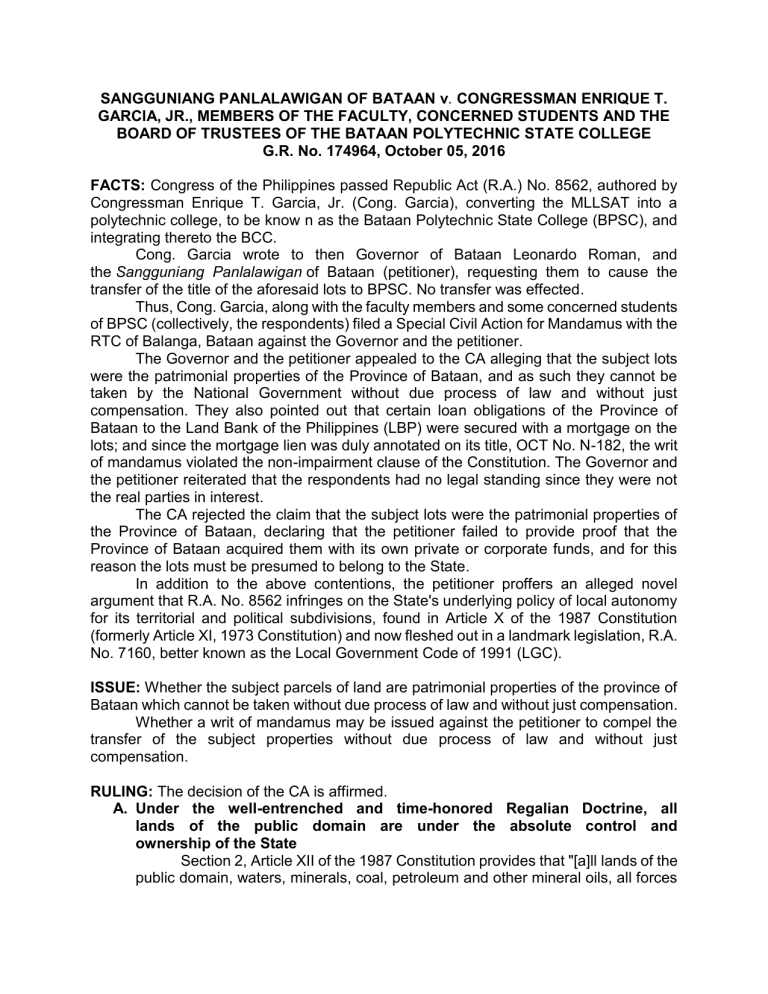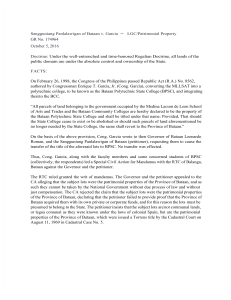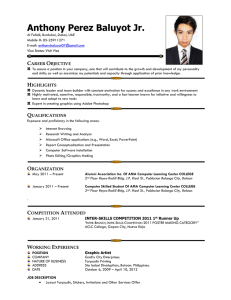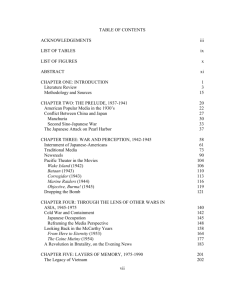
SANGGUNIANG PANLALAWIGAN OF BATAAN v. CONGRESSMAN ENRIQUE T. GARCIA, JR., MEMBERS OF THE FACULTY, CONCERNED STUDENTS AND THE BOARD OF TRUSTEES OF THE BATAAN POLYTECHNIC STATE COLLEGE G.R. No. 174964, October 05, 2016 FACTS: Congress of the Philippines passed Republic Act (R.A.) No. 8562, authored by Congressman Enrique T. Garcia, Jr. (Cong. Garcia), converting the MLLSAT into a polytechnic college, to be know n as the Bataan Polytechnic State College (BPSC), and integrating thereto the BCC. Cong. Garcia wrote to then Governor of Bataan Leonardo Roman, and the Sangguniang Panlalawigan of Bataan (petitioner), requesting them to cause the transfer of the title of the aforesaid lots to BPSC. No transfer was effected. Thus, Cong. Garcia, along with the faculty members and some concerned students of BPSC (collectively, the respondents) filed a Special Civil Action for Mandamus with the RTC of Balanga, Bataan against the Governor and the petitioner. The Governor and the petitioner appealed to the CA alleging that the subject lots were the patrimonial properties of the Province of Bataan, and as such they cannot be taken by the National Government without due process of law and without just compensation. They also pointed out that certain loan obligations of the Province of Bataan to the Land Bank of the Philippines (LBP) were secured with a mortgage on the lots; and since the mortgage lien was duly annotated on its title, OCT No. N-182, the writ of mandamus violated the non-impairment clause of the Constitution. The Governor and the petitioner reiterated that the respondents had no legal standing since they were not the real parties in interest. The CA rejected the claim that the subject lots were the patrimonial properties of the Province of Bataan, declaring that the petitioner failed to provide proof that the Province of Bataan acquired them with its own private or corporate funds, and for this reason the lots must be presumed to belong to the State. In addition to the above contentions, the petitioner proffers an alleged novel argument that R.A. No. 8562 infringes on the State's underlying policy of local autonomy for its territorial and political subdivisions, found in Article X of the 1987 Constitution (formerly Article XI, 1973 Constitution) and now fleshed out in a landmark legislation, R.A. No. 7160, better known as the Local Government Code of 1991 (LGC). ISSUE: Whether the subject parcels of land are patrimonial properties of the province of Bataan which cannot be taken without due process of law and without just compensation. Whether a writ of mandamus may be issued against the petitioner to compel the transfer of the subject properties without due process of law and without just compensation. RULING: The decision of the CA is affirmed. A. Under the well-entrenched and time-honored Regalian Doctrine, all lands of the public domain are under the absolute control and ownership of the State Section 2, Article XII of the 1987 Constitution provides that "[a]ll lands of the public domain, waters, minerals, coal, petroleum and other mineral oils, all forces of potential energy, fisheries, forests or timber, wildlife, flora and fauna, and other natural resources are owned by the State, x x x." B. Local government property devoted to governmental purposes, such as local administration, public education, and public health, as may be provided under special laws, is classified as public. If the property is owned by the municipal corporation in its public and governmental capacity, it is public and Congress has absolute control over it; but if the property is owned in its private or proprietary capacity, then it is patrimonial and Congress has no absolute control, in which case, the municipality cannot be deprived of it without due process and payment of just compensation. 26 C. Property registered in the name of the municipal corporation but without proof that it was acquired with its corporate funds is deemed held by it in trust for the State. It may, therefore, be laid down as a general rule that regardless of the source or classification of land in the possession of a municipality, excepting those acquired with its own funds in its private or corporate capacity, such property is held in trust for the State for the benefit of its inhabitants, whether it be for governmental or proprietary purposes. D. R.A. No. 8562 was not intended to expropriate the subject lots titled in the name of the Province of Bataan, but to confirm their character as communal land of the State and to make them available for disposition by the National Government. "Regardless of the source or classification of land in the possession of a municipality, excepting those acquired with its own funds in its private or corporate capacity, such property is held in trust for the State for the benefit of its inhabitants, whether it be for governmental or proprietary purposes. It holds such lands subject to the paramount power of the legislature to dispose of the same, for after all it owes its creation to it as an agent for the performance of a part of its public work, the municipality being but a subdivision or instrumentality thereof for purposes of local administration E. The State's policy to promote local autonomy and to devolve the powers of the National Government to its political subdivisions has for its purpose to improve the quality of local governance. Local autonomy and decentralization of State powers to the local political subdivisions have for their object to make governance directly responsive at the local levels by giving them a free hand to chart their own destiny and shape their future with minimum intervention from central authorities, thereby rendering them accountable to their local constituencies.51 Thus, [h]and in hand with the constitutional restraint on the President's power over local governments is the state policy of ensuring local autonomy. It is clear, then, that local autonomy and decentralization do not deal directly with Issues concerning ownership, classification, use or control of properties of the public domain held by local governments. The State retains power over property of the public domain, exercised through Congress. F. The Province of Bataan has the duty to provide an adequate security for its loans with the LBP, without defeating BPSC's right to hold title to the contested lots. The RTC ordered the Province of Bataan to deliver the owner's duplicate copy of OCT No. N-182 to the Register of Deeds of Bataan, free from any lien or encumbrance, to execute the corresponding deed of conveyance in favor of BPSC, and to cause the transfer and registration of the title to and in the name of the said college. The Province of Bataan erroneously believed that it could mortgage the subject lots, notwithstanding that it held the same in trust for the State and despite the fact that the said lots were actually being occupied by two government schools. As the RTC urged, then, the Province of Bataan must address this issue of security for its loans with LBP. It cannot complain that its compliance with the order of the RTC might violate the non-impairment clause of the Constitution, since its duty to provide a replacement security for its loans with LBP is clear. G. BPSC is entitled to a writ of mandamus. At issue in this petition is Section 24 of R.A. No. 8562, which directs that "[a]ll parcels of land belonging to the government occupied by the [MLLSAT] and the [BCC] are hereby declared to be the property of the [BPSC] and shall be titled under that name." There is no dispute that the Congress has expressly intended to entrust to BPSC the titles to the subject lots. Being the sole beneficiary of Section 24 of R.A. No. 8562, BPSC is the real party in interest, and is entitled to mandamus to enforce its right thereunder.







